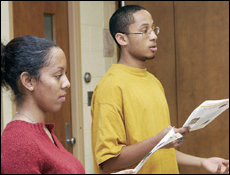Public Life in America: The Service-Learning Writing Project
- David D. Cooper
- Writing, Rhetoric, and American Cultures
- College of Arts and Letters

WRA 135 students working on a brochure
From MSU's inception in 1855, applying knowledge has been core to its mission. The University's goal is not solely to send its graduates into the world with a basic skill set and a diploma, but also to encourage them to use their interests to become active participants in the work of democracy. Students are presented with opportunities for involvement through the Center for Service-Learning and Civic Engagement (CSLCE) and a plethora of student organizations.
A large number of students do, in fact, get involved through either the CSLCE or the study abroad program—the CSLCE alone placed over 11,000 students in service assignments in the 2005-2006 school year. However, some still slide through their undergraduate careers with little to no understanding of academic civic involvement.
Hence the Service-Learning Writing Project, created in 1992 by David Cooper, professor in the department of Writing, Rhetoric, and American Cultures. Generally, service-learning courses are introduced at the uppermost curricular level and slowly percolate down. Cooper, however, decided to root service-learning in the general education curriculum first and slowly move it upwards into a full academic program. After establishing a first year writing course, he designed a gateway course in a new major track in professional writing (Writing in the Public Interest). Cooper then added an elective junior seminar in the American Studies Program on Civic America, and finally developed a senior capstone course—a process he calls "the four seasons of deliberative learning."
Originally Cooper had intended to do a simple introduction to the culture of civic life, but in 2002 his focus shifted toward an active pedagogy that challenged his students to plan, design, participate in, and moderate public forums. This refocusing led to further development and refinement of the first year writing course WRA 135: Public Life in America, which unites intellectual content, writing instruction, community-based service-learning, and deliberative democracy to create an active civic learning experience.
Each WRA 135 class is unique. Some classes participate in a number of smaller projects, but most undertake a single, large-scale community writing assignment resulting from a collaborative partnership developed either through the CSLCE or through the interests of the faculty member teaching the class.
A recent faculty member, for example, was interested in animal rescue efforts. His class project was a collaboration with a local racehorse rescue organization named CANTER: Communication Alliance to Network Thoroughbred Ex-Racehorses. Student writing projects included a newsletter for the organization.
Other professors have focused on issues of social justice or education. Cooper's particular interests lie in cultivating students' public work skills and the deliberative practices of democracies. One project he led required three different semesters to complete. In the first semester, students researched and wrote policy briefs on issues involving health, the environment, technology, and social policy. The second group of students compiled these briefs into a handbook, Generation Y Speaks Out: Public Policy Perspectives through Service-Learning, which was then presented to Michigan legislators in a public forum by students taking the course in the following semester.
Although Cooper no longer directly teaches the WRA 135 course, he remains heavily involved in the project and still coordinates the faculty who teach the course. The lessons learned through his experiences with the course have greatly affected his own academic career and his view of the University's threefold mission of teaching, research, and service. For Cooper and the faculty and students of Public Life in America, there are no boundaries among the three.
- Written by Lisa Eldrid, University Outreach and Engagement
- Photographs courtesy of David D. Cooper, Writing, Rhetoric, and American Cultures, College of Arts and Letters